Everyone makes mistakes from time to time. The kind of errors and the impacts they have can differ greatly. Certain mistakes have been so massive that they fundamentally changed the world in one way or another. Winston Churchill believed that the winners pen history, but as this composition will highlight, that’s not consistently the case. From the disastrous sinking of the RMS Titanic to the devastating Deepwater Horizon oil spill, we will delve into 25 of the most pivotal blunders that have permanently modified history.

Napoleon´s and Hitler´s invasion of Russia in winter
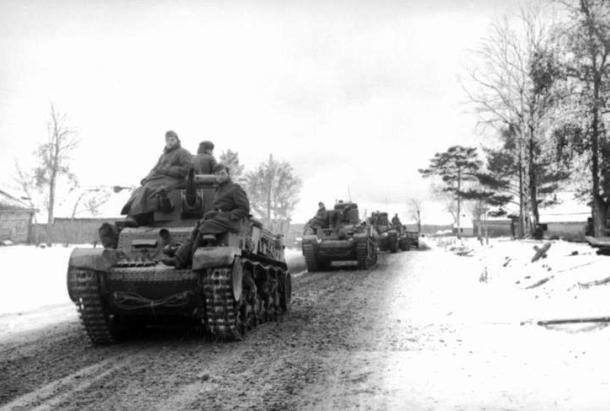 Source: brainscape.com
Source: brainscape.com Both Napoleon Bonaparte (in summer 1812) and Adolf Hitler (in summer 1941) tried to invade Russia, but the Russians held out longer than expected. The enemies ended up fighting in the notorious Russian winter. Neither Napoleon’s nor Hitler’s army were prepared for the extreme weather conditions and were eventually defeated by the Russians.
Mao Zedong's order to kill sparrows
 Source: mnn.com, image: https://pixabay.com (public domain)
Source: mnn.com, image: https://pixabay.com (public domain) In 1958 in China, Mao Zedong, the founding father of the People’s Republic of China, decided his country could do without pests like sparrows, so he ordered to kill all of these birds. Three years later, as many as 45 million people starved to death as the elimination of sparrows led to overpopulation of insects (particularly locust) that ate all the crops.
Ronald Wayne selling his stake in Apple
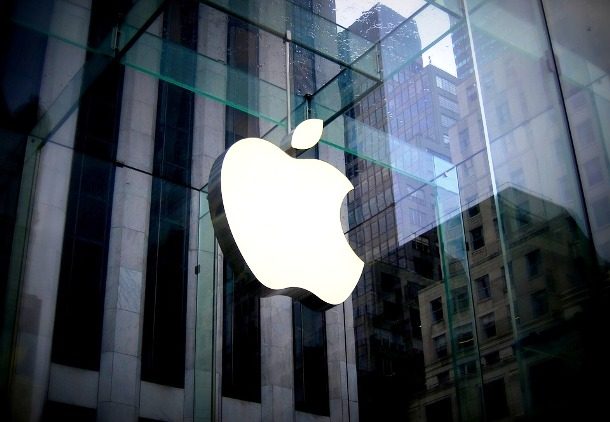 Source: www.washingtonpost.com, image: https://pixabay.com (public domain)
Source: www.washingtonpost.com, image: https://pixabay.com (public domain) Ronald Wayne was the third co-founder and 10 percent shareholder of Apple Computer. In April 1976, Wayne decided to sell his stake for a mere $800. Had he held onto to it, that 10 percent stake would today be worth a staggering $63 billion.
Grad student killing world´s oldest tree
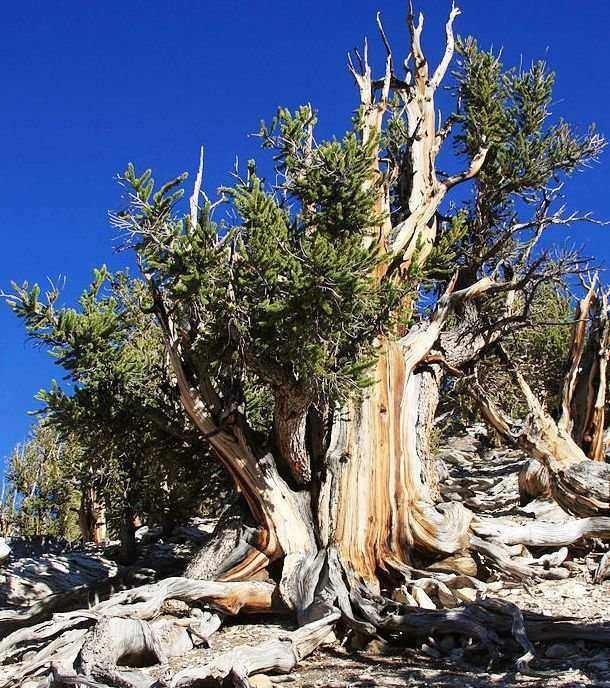 Source: smithsonianmag.com
Source: smithsonianmag.com In 1964, Donal Rusk Currey, a grad student, got his tree corer stuck in a Great Basin bristlecone pine. To remove the tool, a park ranger helped him to cut the tree down. Later on, Currey began to count the rings, eventually finding out that the tree was almost 5,000 years old – it was the oldest tree ever recorded.
Leaning Tower of Pisa
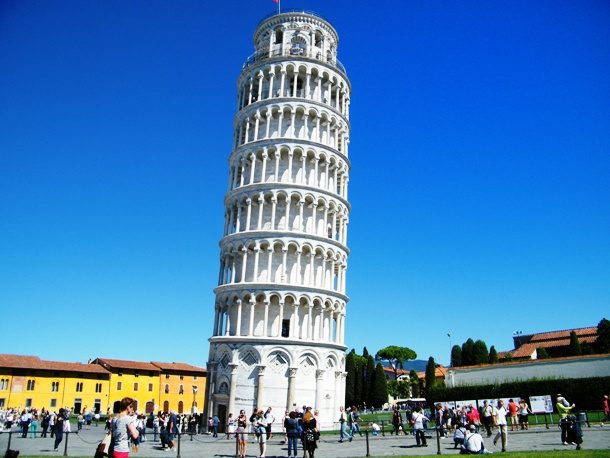 Source: dailymail.co.uk, image: https://www.goodfreephotos.com (public domain)
Source: dailymail.co.uk, image: https://www.goodfreephotos.com (public domain) It took 177 years to build the Tower of Pisa but just 10 years after its completion in 1372, it started leaning due to soil subsidence. The lean degree was 5.5, but after the 2010 restoration, it is now “just” 3.99; the restorers are confident no more work will need doing to the tower for the next two centuries.
Sinking of RMS Titanic
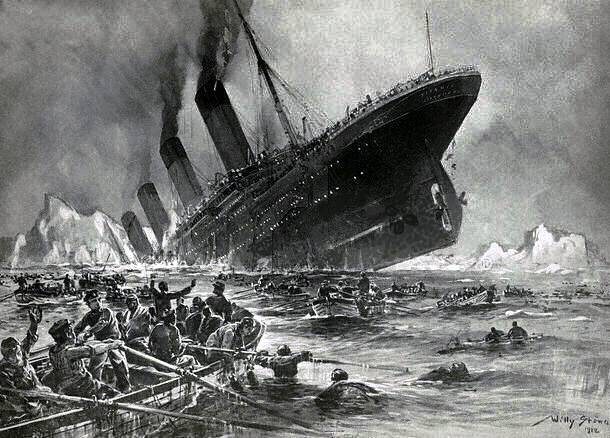 Source: wikipedia.org, image: https://commons.wikimedia.org/ (public domain: author's life +80 yrs)
Source: wikipedia.org, image: https://commons.wikimedia.org/ (public domain: author's life +80 yrs) The largest passenger liner in service at the time, RMS Titanic was often described as “unsinkable” prior to its first maiden voyage from Southampton to New York City in April 1912. Unfortunately, Titanic proved to be sinkable after hitting an iceberg, resulting in the deaths of more than 1,500 out of the total 2,224 people on board. Many of them died just because there were not enough lifeboats.
Russia selling Alaska to US
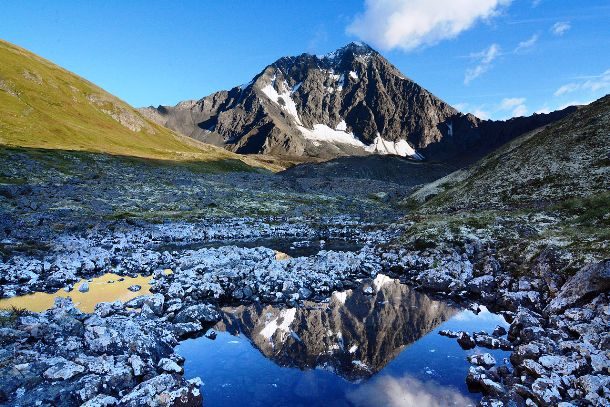 Source: indiancountrymedianetwork.com
Source: indiancountrymedianetwork.com On October 18, 1867, the United States purchased Alaska from Russia for two cents an acre ($7.2 million in gold) as the Russians thought it was nothing but useless tundra. Soon after that, in the 1880’s and 1890’s, massive gold mining began there, and it actually continues today. Alaska still produces more gold than any other US state, except Nevada.
Discovery of penicillin
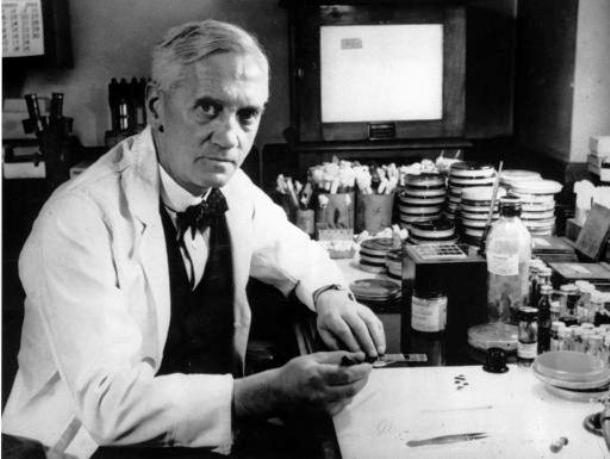 Source: mentalfloss.com, image: https://en.wikipedia.org (public domain)
Source: mentalfloss.com, image: https://en.wikipedia.org (public domain) Alexander Fleming, a Scottish biologist, pharmacologist, and botanist, did not really care much about hygiene while working. Oddly enough, it was because of his relaxed attitude toward a clean working environment that he eventually ended up discovering penicillin, the world’s first antibiotic, after a bacteria-killing fungus appeared on his dish.
Boeing close to disaster after metric conversion error
 Source: nytimes.com
Source: nytimes.com In 1983, Air Canada’s first-ever Boeing 767 had to glide to a safe landing when it ran out of fuel. Someone did not convert the number of gallons of fuel it needed to liters. After both engines lost their power, the pilots made what is now thought to be the first successful emergency ”dead stick” landing of a commercial jetliner.
Lost hunter starting wildfire
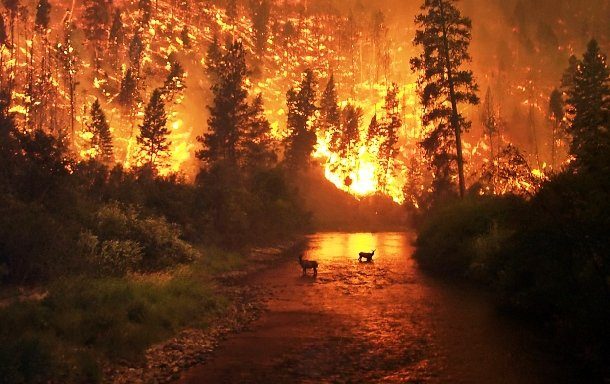 Source: web.archive.org, image: https://simple.wikipedia.org (public domain)
Source: web.archive.org, image: https://simple.wikipedia.org (public domain) A novice hunter, Sergio Martinez of West Covina, California, got lost in woods near San Diego, so he decided to shoot off a flare. Unfortunately, the flare ignited what is now referred to as the largest wildfire in Californian history. Known as the the Cedar Fire, the wildfire burned over 280,000 acres (1,133 km2) of land in San Diego County.
Think this was a big boo-boo? Wait until you see number 7!
Londoners killing cats
 Source: http://offbeat.topix.com, image: https://pixabay.com (public domain)
Source: http://offbeat.topix.com, image: https://pixabay.com (public domain) During the Great Plague of London in 1665, people suspected that cats were spreading the disease, so they started killing them. However, once the cat population started to fall, the plague got even worse – because there were no cats to kill the real plague carriers, the rats. The Great Plague eventually killed about 100,000 people, almost a quarter of London’s population, in just 18 months.
If you’re enjoying this list, be sure to check out 25 Biggest And Most Embarrassing Mistakes Ever Made.
Archduke Franz Ferdinand’s driver making a wrong turn
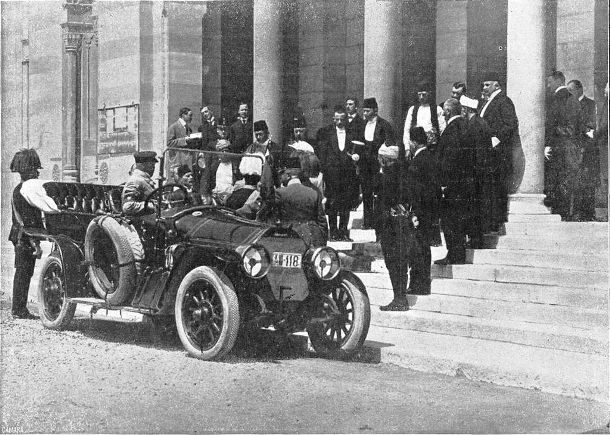 Source: forbes.com, image: https://commons.wikimedia.org (public domain: author's life + 80 yrs)
Source: forbes.com, image: https://commons.wikimedia.org (public domain: author's life + 80 yrs) The assassination of Archduke Franz Ferdinand of Austria and his wife, Sophie, in Sarajevo on 28 June 1914 is considered the event that caused World War I. This tragedy could have been avoided had the archduke’s driver not made a wrong turn that took them in the path of the assassinator Gavrilo Princip. Princip, astonished at his unexpected opportunity, shot both the archduke and his wife dead.
Leaving the gate open in Constantinople
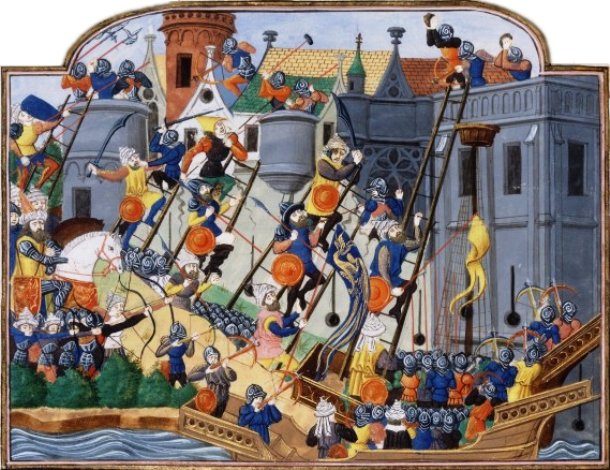 Source: cracked.com, image: https://commons.wikimedia.org (public domain: author's life + 100 yrs)
Source: cracked.com, image: https://commons.wikimedia.org (public domain: author's life + 100 yrs) From the mid-5th century to the early 13th century, Constantinople was the largest and wealthiest city in Europe as it survived many attacks and sieges from Barbars, Arabs, Bulgarians, and Russians. In 1453, the city was besieged by the Turks and someone accidentally left one of the gates open, allowing the Turks to get in. The inhabitants were massacred or enslaved and Emperor Constantine XI was killed.
Decca Records rejecting The Beatles
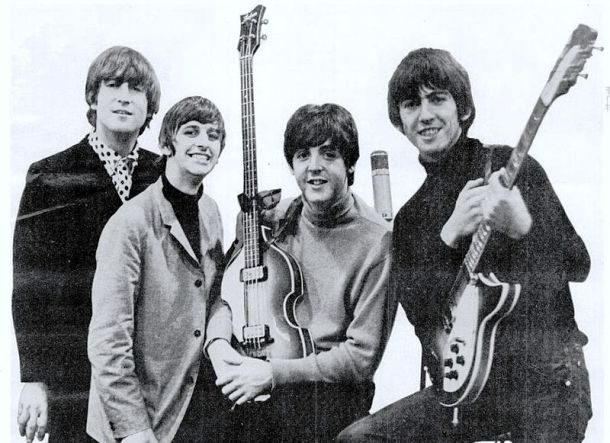 Source: independent.co.uk, image: https://cs.wikipedia.org (public domain: published between 1923 & 1977)
Source: independent.co.uk, image: https://cs.wikipedia.org (public domain: published between 1923 & 1977) In February 1962, a relatively unknown music band The Beatles auditioned for the Decca Records Company in London. They performed 15 songs but did not give a particularly good account of themselves and the company rejected them. As we all know, The Beatles later became one of the most popular and successful bands of all time.
Austrian army defeating themselves
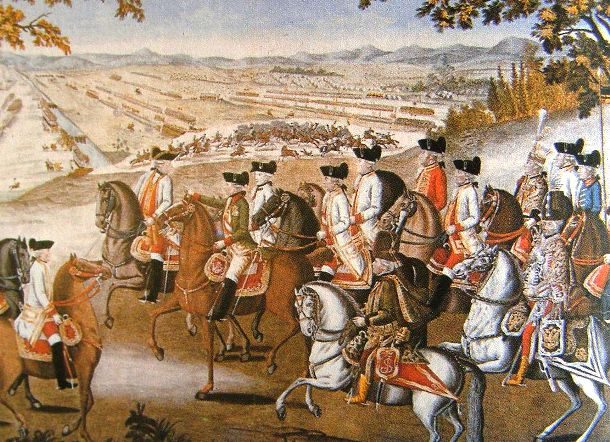 Source: todayifoundout.com, image: https://en.wikipedia.org (public domain: author's life + 100 yrs or less)
Source: todayifoundout.com, image: https://en.wikipedia.org (public domain: author's life + 100 yrs or less) In the 1788 Battle Of Karansebes (modern Romania), the Austrian army allegedly broke into two and ended up mistakenly fighting itself. The Turks, who the Austrians were supposed to fight, arrived on the site two days later to find 10,000 dead or wounded Austrian soldiers.
Blockbuster passing on acquiring Netflix
 Source: businessinsider.com
Source: businessinsider.com In 2000, Reed Hastings approached former Blockbuster CEO John Antioco and asked for $50 million to give away the company he founded — Netflix. Antioco, thinking that it was a “very small niche business,” ended the negotiations and didn’t buy Netflix, which at the time, was only a DVD mailing service. Now Netflix — just short of being worth the same as CBS last year — soared past the television network owner with a $32.9 billion market valuation.
Blockbuster isn’t the only company to have made this type of mistake! Check out 25 Regrettable Corporate Facepalms You Probably Recall.
NASA orbiter lost due to metric mishap
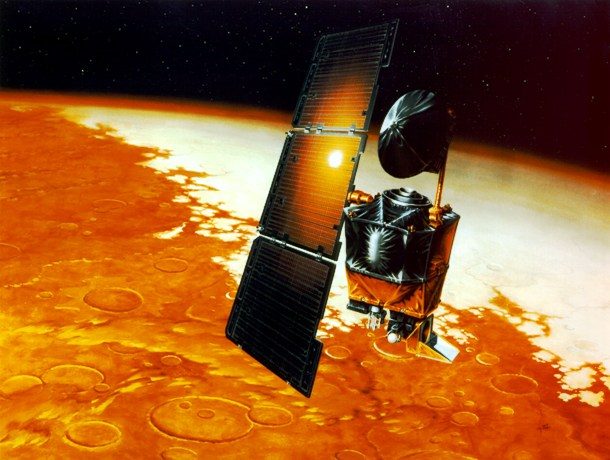 Source: edition.cnn.com, image: https://commons.wikimedia.org (public domain)
Source: edition.cnn.com, image: https://commons.wikimedia.org (public domain) In 1999, NASA lost a $125 million Mars orbiter because a Lockheed Martin engineering team used English units of measurement while the agency’s team used the more conventional metric system for a key spacecraft operation.
NASA deleting footage of moon landing
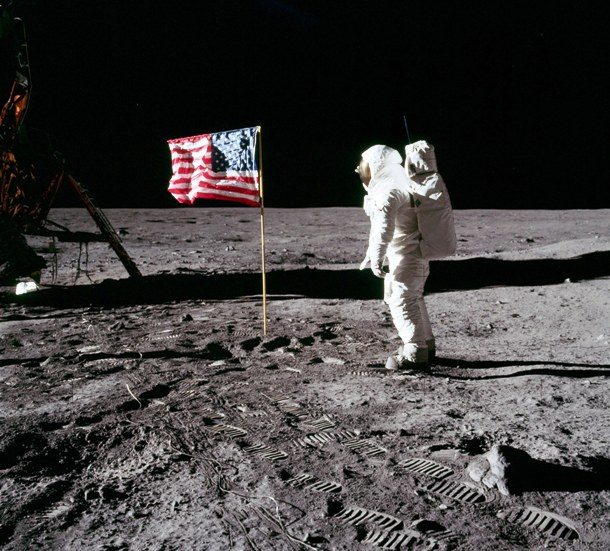 Source: reuters.com, image: https://en.wikipedia.org/wiki/Moon_landing (public domain)
Source: reuters.com, image: https://en.wikipedia.org/wiki/Moon_landing (public domain) Talking about NASA, there is another thing they are definitely not proud of. When they set out to look for their tapes of the iconic 1969 moon landing, they discovered that the tapes had been accidentally erased and re-used to save money. To create a new official version of the moon landing video, NASA had to track down the footage from TV stations around the world and digitally restore it.
Baker burning down London
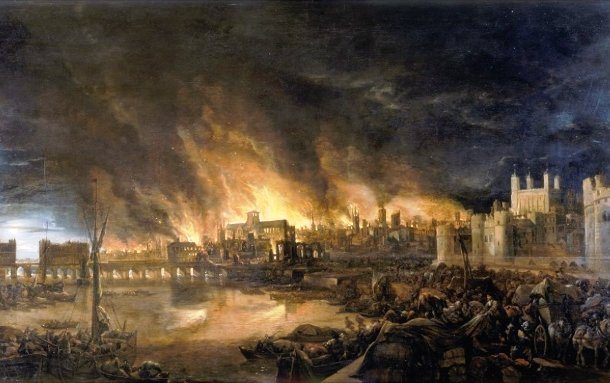 Source: Tinniswood via Wikipedia, image: https://commons.wikimedia.org (public domain: author's life + 100 yrs or less)
Source: Tinniswood via Wikipedia, image: https://commons.wikimedia.org (public domain: author's life + 100 yrs or less) Just one year after the Great Plague of London that ravaged the city in 1665, Britain’s metropolis was hit by another disaster as a baker Thomas Farriner got distracted somehow, and his bakery on Pudding Lane caught on fire. The fire soon spread to other parts of the city, eventually leading to the destruction of over 13,200 houses and 87 churches.
Julius Caesar going to senate
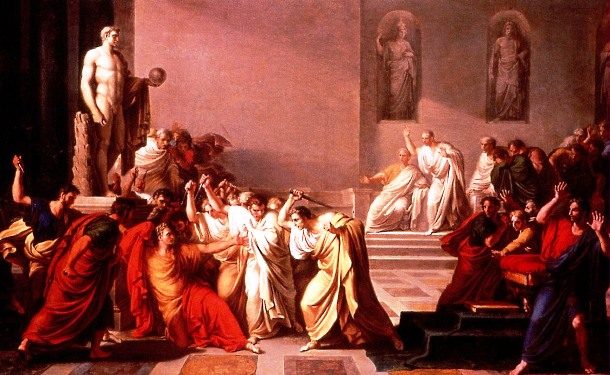 Source: The Murder of Caesar and Political Assassination via wikipedia, image: https://de.wikipedia.org (public domain: author's life + 100 yrs or less)
Source: The Murder of Caesar and Political Assassination via wikipedia, image: https://de.wikipedia.org (public domain: author's life + 100 yrs or less) Caesar was warned by his wife not to go to senate, but the Roman politician, famous for his arrogance, went there on 15 March, 44 BC anyway. Unfortunately for him, he ended up being stabbed to death by about 60 members of the senate, including his best friend Brutus.
Chernobyl disaster
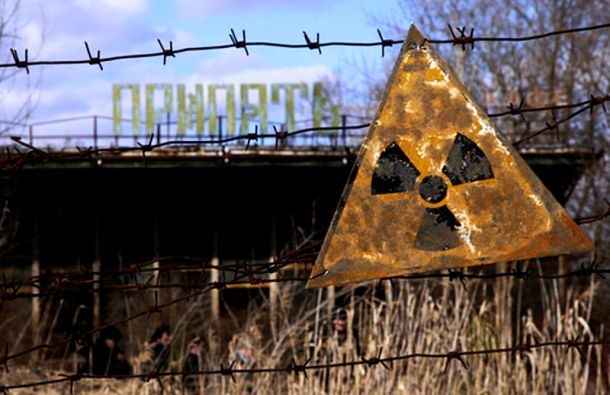 Source: Wikipedia.org, image: https://commons.wikimedia.org (public domain)
Source: Wikipedia.org, image: https://commons.wikimedia.org (public domain) On 26 April, 1986, during a hurried late night power-failure stress test, in which safety systems were deliberately turned off, a combination of inherent reactor design flaws, together with the reactor operators arranging the core in a manner contrary to the checklist for the stress test resulted in what turned out to be the worst nuclear disaster in history.
Cerro Grande fire
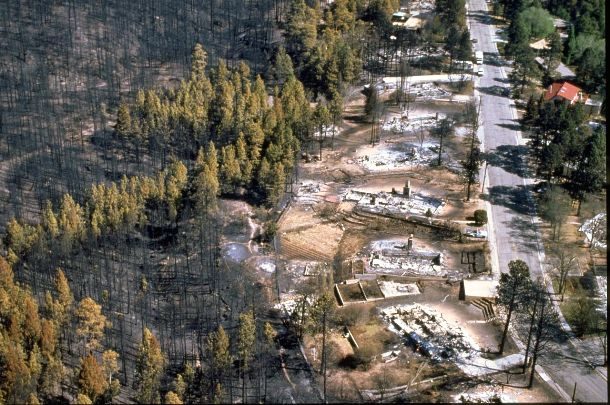 Source: http://offbeat.topix.com, image: https://commons.wikimedia.org (public domain)
Source: http://offbeat.topix.com, image: https://commons.wikimedia.org (public domain) The devastating Cerro Grande fire in 2000 originally started as a controlled burn. However, it quickly grew out of control due to the dry weather and high winds. Over 400 families in the town of Los Alamos, New Mexico, lost their homes due to the fire that eventually burned for 3 months.
Soviet engineers burning gas pocket
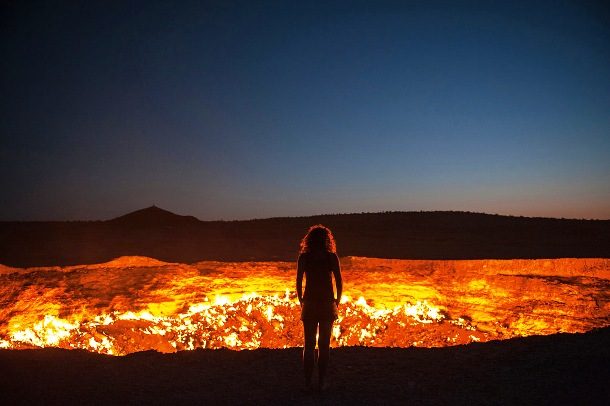 Source: Pakistan Daily Times via wikipedia
Source: Pakistan Daily Times via wikipedia After a drilling rig collapsed into a crater in Darvaza, central Turkmenistan in 1971, Soviet engineers decided to set the gases on fire, thinking it would burn out in a few weeks. Now, 46 years later, the crater is still burning. It actually became one of the most popular tourist attractions in the country.
Columbus´ voyage to America
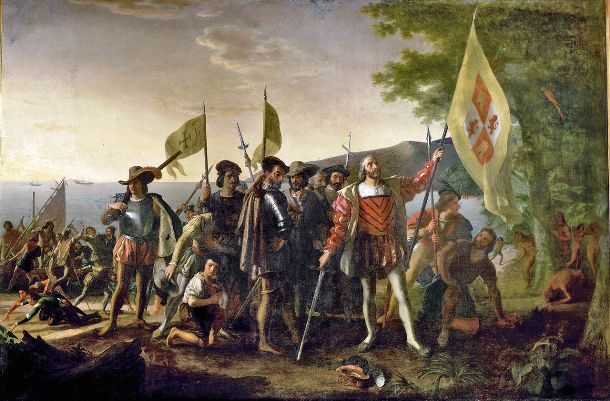 Source: prezi.com, image: https://commons.wikimedia.org (public domain: author's life +100yrs or less)
Source: prezi.com, image: https://commons.wikimedia.org (public domain: author's life +100yrs or less) In 1492, Columbus sailed the Atlantic Ocean and landed in Latin America, although he thought he just discovered another trade route to India. He and his men also accidentally transferred diseases (such as smallpox) to the natives whose immune systems could not deal with the new diseases. Eventually, entire populations of the indigenous Americans were wiped out.
Deepwater Horizon oil spill
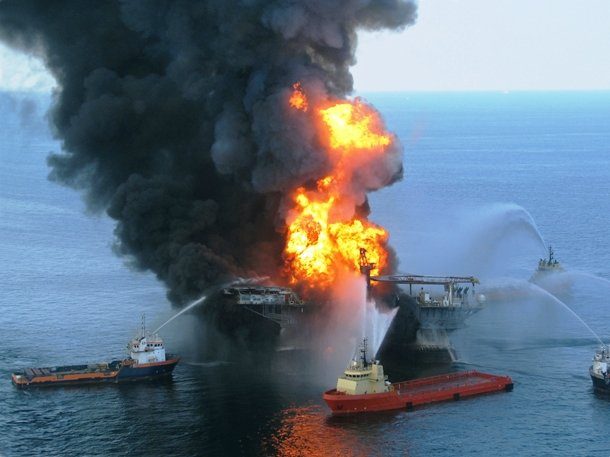 Source: businessinsider.com, image: https://en.wikipedia.org (public domain)
Source: businessinsider.com, image: https://en.wikipedia.org (public domain) On April 20, 2010, a British Petroleum (BP) oil rig in the Gulf of Mexico burst, pushing nearly five million barrels of oil from the well. It was the largest oil spill in history, surpassing the 3.3 million barrels that spilled into the Bay of Campeche in Mexico in 1979. Affecting a total area of up to 68,000 sq mi (176,100 km2), the disaster had devastating effects on the marine life, killing millions of fish, turtles, sea mammals, birds, and other animals.
Lists Going Viral Right Now
Photos: 25. Bundesarchiv, Bild 101I-268-0185-05A / Böhmer / CC-BY-SA 3.0, Bundesarchiv Bild 101I-268-0185-05A, Russland, Panzer 35t, CC BY-SA 3.0 DE, 22. Dcrjsr, Big bristlecone pine Pinus longaeva, CC BY-SA 3.0, 19. Paxson Woelber, Bold Peak. Chugach Mountains, Alaska, CC BY-SA 3.0, 17. abdallahh via flickr, CC BY 2.0, 10. Michel Ngilen via flickr, CC BY 2.0, 3. Roderick Eime via flickr, CC BY 2.0



























